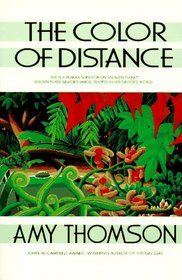Helpful Score: 3
This is a really good hard-sci fi first contact story. The book is well written, the characters are well drawn and sympathetic, and the aliens are enough alien to be intriguing and enough like us that we can empathize with them. A very ecological theme runs through the book.
There is a sequel to this book that takes place on Earth (this one takes place on the aliens' world). The sequel is not nearly as good as this is, I think.
There is a sequel to this book that takes place on Earth (this one takes place on the aliens' world). The sequel is not nearly as good as this is, I think.
Helpful Score: 1
Survey biologist Juna Saari is left for dead on an alien planet after her team's flyer crashes into the jungle. She is rescued by the previously unknown sentient aliens known as Tendu, but only through their extreme medical intervention. Although she contacts her spaceship through radio, they will not be able to return for her for five years - for the meantime, she's stranded, and must learn to adapt and survive in an alien culture.
Sometimes slow-moving, the book is more concerned with the rich cultural details of the humanoid but frog-like Tendu than with action-adventure scenes. Based on the author's visits to the rainforests of Costa Rica, the arboreal and community-oriented lifestyle of the aliens really comes alive.
In the sequel, Through Alien Eyes, Survey returns for Juna, accompanied by a horde of politically-motivated researchers and experts excited to make contact with this new species. Returning to human civilization with two Tendu ambassadors, Juna must navigate treacherous waters to maintain her suddenly-precarious position as bridge between two cultures. Not just culture shock, but legal battles ensue.
In both books, Thompson uses the contrast between the Tendu and humanity to discuss the importance of ecology, issues of population control, and the importance of harmony and balance. There are a few preachy moments, but overall the 'message' is not too overt. Although humanity is shown to have problems, there is a hopeful outlook - and the Tendu are not perfect either. Rather, both cultures are shown to have things to learn from the other.
Recommended for fans of Sheri Tepper.
Sometimes slow-moving, the book is more concerned with the rich cultural details of the humanoid but frog-like Tendu than with action-adventure scenes. Based on the author's visits to the rainforests of Costa Rica, the arboreal and community-oriented lifestyle of the aliens really comes alive.
In the sequel, Through Alien Eyes, Survey returns for Juna, accompanied by a horde of politically-motivated researchers and experts excited to make contact with this new species. Returning to human civilization with two Tendu ambassadors, Juna must navigate treacherous waters to maintain her suddenly-precarious position as bridge between two cultures. Not just culture shock, but legal battles ensue.
In both books, Thompson uses the contrast between the Tendu and humanity to discuss the importance of ecology, issues of population control, and the importance of harmony and balance. There are a few preachy moments, but overall the 'message' is not too overt. Although humanity is shown to have problems, there is a hopeful outlook - and the Tendu are not perfect either. Rather, both cultures are shown to have things to learn from the other.
Recommended for fans of Sheri Tepper.




